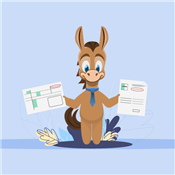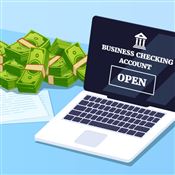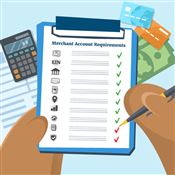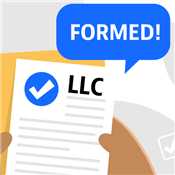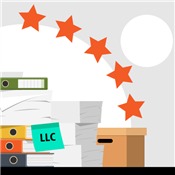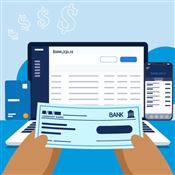What is an EIN?
An EIN is more than a tax requirement. It can also benefit your business in other ways. What is it, and how can you get one? Read on.
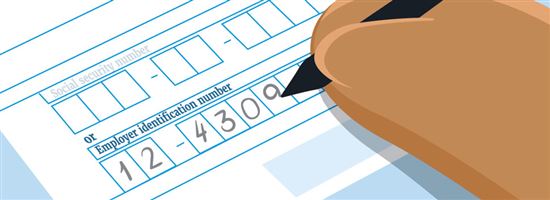 |
- What is an EIN used for?
- What does an EIN look like?
- Who needs an EIN?
- Do sole proprietors need an EIN?
- When do you need a new EIN?
- Why get an EIN? Benefits
- EIN vs SSN
- EIN vs ITIN
- EIN vs TIN
- EIN vs FEIN
- EIN vs State Tax ID Number
- How to get an EIN?
- Tips for a successful EIN registration
- How to cancel an EIN?
- FAQs
Most businesses need an EIN to operate legally. Without one, you won't be able to file your taxes.
If you're new to business, getting an EIN may seem complicated. But it's pretty simple.
So, what exactly is an EIN? What does it cost? And how can you get one for your business?
Read on to answer these questions, including how to maximize the benefits of an EIN.
What is an EIN used for?
An EIN, or "Employer Identification Number," is a 9-digit number assigned to businesses for tax purposes. It acts as a company's unique identifier, similar to an individual's Social Security number (SSN).
Beyond taxes, an EIN offers many other benefits. It's used to open a business bank account, hire employees, and boost credibility. You can learn more about it later in the section below, "Why Get an EIN."
EINs don't expire and are unique to the business entity they're assigned to. The IRS never reissues them to another business, even when the previous owner closes down or applies for a new EIN.
Although it's called an "employer" identification number, you can still get one even if you don't have employees.
Getting an EIN for your business is entirely free if you apply directly with the IRS. But third-party services might charge you if you register through them.
What Does an EIN Look Like?
Every EIN has nine digits. A dash separates the first two digits (the prefix) and the remaining seven numbers (e.g., 12-3456789).
This differentiates it from an SSN, which also has nine digits but is divided into three parts instead of two (e.g., 123-45-6789).
Before 2001, an EIN's prefix indicated where the business was located. After the IRS revamped its system, the prefix now just indicates which campus assigned the EIN. If you want, you can check what your EIN prefix stands for.
Who Needs an EIN?
These types of businesses must get an EIN:
- LLCs: LLCs are separate legal entities and need an EIN, regardless of their chosen tax classification. The only exceptions are single-member LLCs without employees. These business owners can use their SSNs as their EINs.[1]
- Partnerships: A company only needs 1 tax ID number. Since a partnership has more than one owner, business partners can't use their SSNs as their EIN.
- Corporations: A corporation is considered a separate legal entity and needs its own unique identifier.
- Nonprofit Organizations: The IRS requires any nonprofit to have an EIN if they want to gain tax-exempt status.[2]
- Any Business with Employees: They need an EIN to set up a payroll.
Do Sole Proprietors need an EIN?
Sole proprietors don't need an EIN because the owner and company are considered the same entity. You can still use your SSN for tax purposes if you have one.
But you will need an EIN if you:[3]
- Have or will hire employees
- Are buying or inheriting a sole proprietorship
- File excise tax returns for tobacco, firearms, and alcohol
- File pension plan returns
- Have a solo 401(k) or Keogh plan
- File for bankruptcy
Freelancers and independent contractors also don't need an EIN because they can still use their SSNs. But they can still benefit from getting one. The "Why Get an EIN" section will tell you how.
A Keogh plan is a retirement plan for self-employed individuals. This is mainly for sole proprietors, partnerships, and unincorporated businesses. It's tax-deductible up to a specific annual limit.
This plan is popular among high-income business owners because of its higher contribution limits.
Independent contractors can't start a Keogh plan but can open a solo 401(k) plan instead.
When Do You Need a New EIN?
A business' EIN is permanent, and you only get one per business entity. But you'll need a new one in the following situations:
- The company has a new owner. An EIN is non-transferable, so you can't use the previous owner's EIN. A new one will also help you avoid problems the previous owner might have had, like incorrectly claimed tax credits or unpaid taxes.
- You changed your business structure. If you change your business structure (e.g., sole proprietorship to an LLC or vice-versa), your previous structure's EIN will be closed/terminated.
- You add new owners/members to your business. Businesses with multiple owners only need 1 tax ID number. A single-member LLC can no longer use an SSN if it converts to a multi-member LLC. The same applies if you go from a sole proprietorship to a partnership.
You don't need a new EIN if you're just changing your business name, switching locations, expanding, or adding new branches. This is also the case if you're creating new divisions within the company because they don't need their own EINs.[4]
The IRS assigns only one EIN for each business entity. You can't have two EINs for the same business.
You can only have multiple EINs if you create additional business entities like partnerships, LLCs, and corporations. The IRS requires each one to have its own EIN for tax purposes.
Why Get an EIN? The Benefits
There are plenty of reasons to get an EIN, even when you don't need one. Here's how an EIN can help your business:
Easier to Comply with Tax Requirements
An EIN can also decrease the likelihood of IRS audits for home-based companies that claim business tax deductions, like office equipment.
Separates Business from Personal Finances
An EIN can make it easier for sole proprietors, freelancers, and independent contractors to open a separate bank account for their business. This can also make organizing their financial records more manageable.
Protects Your Personal Information
If you're a sole proprietor or independent contractor, you can reduce the risks of identity theft by providing your EIN instead of your SSN in documents.
Establishes Credibility
An EIN makes your business look more professional without formalizing your business structure. It shows interested vendors or customers that you're serious about your business and not just doing it as a hobby.
Increases Chances for Loan Application Approval
Banks usually require a separate bank account for your business before they approve a loan application. An EIN can make opening a business bank account easier, lowering the chance of rejections.
Builds Your Business Credit
Using an EIN instead of an SSN in documents allows your business to establish its own business credit history. This can help when trying to get better financing because lenders can refer to this instead of your personal credit history.
Allows You to Hire Employees
You'll need an EIN before you can set up a payroll account. But even if you're planning to wait to hire employees, getting an EIN is still a good idea. It will eliminate delays in the hiring process if you eventually decide to hire someone.
EIN vs. SSN
A Social Security number (SSN) is a unique 9-digit identifier assigned to all eligible U.S. residents and citizens. Non-residents and non-citizens can't apply for an SSN.
The government mainly uses your SSN to track your income and determine your benefits. It's also used for other purposes like opening bank accounts, paying taxes, and applying for loans.
An EIN's purpose is similar to an SSN, but for businesses instead of individuals. Anyone who has a company operating in the U.S. can get an EIN. This includes foreigners and citizens residing overseas.
Business owners can use their SSN instead of an EIN if they're sole proprietors, single-member LLCs, or freelancers/independent contractors. But they need a separate EIN if they have employees or add more owners/members.
EIN vs. ITIN
An ITIN stands for "Individual Taxpayer Identification Number." The government assigns this to individuals who can't get an SSN but need a federal tax ID or have to file U.S. tax returns.
EINs and ITINs have the same purpose - to allow non-residents/citizens to comply with U.S. tax requirements. But if you're a foreigner applying for an EIN, you'll still need a valid ITIN to be eligible.
EIN vs. TIN
TIN stands for "Tax Identification Number." It's a general term that refers to several tax ID numbers, including EINs, SSNs, and ITINs. This term also covers ATINs (adoption taxpayer identification numbers) and PTINs (preparer tax identification numbers).
Meanwhile, an EIN is a specific term referring to a business tax identification number. Both are used for reporting taxes to the government.
EIN vs. FEIN
FEIN stands for "Federal Employer Identification Number." EIN and FEIN are just two different terms referring to the same thing. FEINs are generally just referred to as EINs.
EIN vs. State Tax ID Number
Some people use EIN to refer to a business's state tax ID number. But an EIN is not the same as a state tax ID number.
A state tax ID number is used only for paying taxes within the state. EINs are used to report taxes on a national level. But some states still require companies to get a state tax ID number, even if they already have an EIN.
Another difference is that state tax ID numbers are issued by the state's Department of Revenue, while the IRS issues EINs.
How to Get an EIN?
You can apply for an EIN in four ways:
Online
This is the easiest and fastest way to get an EIN. But only business owners with a U.S. address can apply online. International applicants with no U.S. address have to use other methods.
To apply for an EIN online, you just have to go to the IRS' official website and fill out the questionnaire. You'll need to provide the following information:
- Name of the person responsible for the business (the business owner)
- Their individual tax ID number (SSN, ITIN, or EIN if they're another business)
- Business name and address
- Entity type (LLC, corporation, partnership, etc.)
- Reason for applying
- Business' primary industry (e.g., retail, agriculture, manufacturing, etc.) and activity (e.g., computer sales, home repairs, transportation, etc.)
- Current or expected number of employees within the next 12 months
- Business start or acquisition date
If you have a previous EIN, you also need to indicate that in your answers. You'll receive your EIN immediately after your application is approved.
If you're applying online, you must complete your EIN application in one session. You can't save your progress and return to it later. If you don't, you'll have to wait until the next day to try again.
By Mail
International applicants can choose to mail their application if they don't have a physical address in the U.S. They only need to fill out Form SS-4 and send it to the IRS.
If you have a U.S. address, you need to mail your application here:
Attn: EIN Operation
Cincinnati, OH 45999
If you're an international applicant with no U.S. address, you need to send your application to this address:
Attn: EIN International Operation
Cincinnati, OH 45999
Mailed applications typically have the longest processing time. You'll normally receive your EIN within 4 to 6 weeks after the IRS approves your application.
By Fax
Like mailed applications, you just need a completed Form SS-4 and fax it over to the IRS.
You can send your applications to these numbers:
- 855-641-6935 (for U.S. residents and citizens)
- 304-707-9471 (for international applicants with no U.S. address)
- 855-215-1627 (for applicants within the U.S. but no U.S. address)
You'll usually get your EIN around 4 days after your application is approved.
By Phone
Only international applicants can apply via phone call. To apply by phone, call the IRS hotline at 267-941-1099, Monday to Friday, 6 AM to 11 PM ET.
Like online applications, you'll receive your EIN immediately after approval.
The person calling must be authorized to answer the questions on Form SS-4 and receive the EIN after the IRS approves the application.
The business owner must also sign the form to validate the caller as an authorized representative. Their representative's authorization ends after they receive the EIN.
Tips for a Successful EIN Registration
Here's how you can ensure your application is successful:
- Double-check your eligibility before applying. All unqualified applications will be rejected immediately. This is especially inconvenient if you're mailing your application because it can take weeks to hear back from the IRS.
- Make sure all the given information is correct and accurate. This lowers your chances of rejection.
- Ensure you have a stable internet connection. Online applications must be completed in one session. You can't save and return to it later. You can also only apply for an EIN once a day.
- Make sure your LLC formation is approved before applying. Your EIN application might be rejected otherwise.
- Get the business owner's signature if you're an authorized representative. The IRS won't give you the EIN if you don't have proof you're authorized to receive it.
How to Cancel an EIN?
You can't cancel an EIN because it's permanently assigned to your business and cannot be reissued to another company.
But the IRS can close your business account in the following scenarios:[6]
- You received an EIN but won't need it because you never started your business.
- You have a new EIN.
To request your account's closure, you just have to send a letter to the IRS with the necessary details.
This includes:
- Your business' complete legal name
- Current EIN
- Business address
- Reason you're closing the account.
You can also include your EIN Assignment Notice when mailing the letter.
You can mail your letter to these addresses:
MS 6055
Kansas City, MO 64108
Internal Revenue Service
MS 6273
Ogden, UT 84201
You can also check out this link for more instructions on how to close your business account with the IRS.
FAQ
How long will it take to get an EIN?
It depends on how you apply for one. You'll get your EIN immediately if you register online or via phone. Meanwhile, it takes around 4 days to receive it if you fax your application and 4 to 6 weeks if you mail it.
What should I do if I lost or misplaced my EIN?
You can look for the IRS confirmation notice when you received your EIN. You can also check the documents where you might have used your EIN such as tax returns, bank account statements, business licenses, loan applications, etc.
If you still can't find it, you can call the IRS Business and Specialty Tax Line at 800-829-4933. They're available from 7 AM to 7 PM, Monday to Friday. You have to answer several questions to verify your identity.
What should I do if someone steals my EIN?
You need to report it to the IRS by calling their toll-free hotline at 800-908-4490 for further assistance. You might also need to file Form 14039-B and a Business Identity Theft Affidavit to report the theft.
Bottom Line
You need an EIN for your business if you're an LLC with multiple members, a corporation, or a partnership.
Even if you don't need an EIN, getting one is still a good idea because of its benefits.
An EIN can make opening a bank account for your business easier. It can also protect your personal information since you no longer have to use your SSN for reporting taxes.
Just make sure you're eligible for an EIN and have all the requirements before registering to ensure your application is approved.
References
- ^ Internal Revenue Service. Single Member Limited Liability Companies, Retrieved 12/5/2022
- ^ Internal Revenue Service. Employer Identification Numbers for Tax-Exempt Organizations, Retrieved 12/5/2022
- ^ Internal Revenue Service. Do You Need an EIN?, Retrieved 12/5/2022
- ^ Internal Revenue Service. Do You Need a New EIN?, Retrieved 12/5/2022
- ^ Internal Revenue Service. Topic No. 857 Individual Taxpayer Identification Number (ITIN), Retrieved 12/5/2022
- ^ Internal Revenue Service. Canceling an EIN - Closing Your Account, Retrieved 12/5/2022
Write to Alyssa Supetran at feedback@creditdonkey.com. Follow us on Twitter and Facebook for our latest posts.
|
|
|
